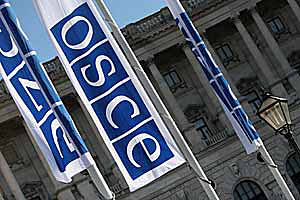Slovakian researcher’s UN internship
Mon, 09 Dec 2013 11:04:00 GMT
Ivana makes her mark at the United Nations and at the Organisation for Security and Co-operation in Europe
 SLOVAKIAN research student Ivana Ulicna has gone all the way to the United Nations (UN) and the Organisation for Security and Co-operation in Europe (OSCE) – via the University of Huddersfield. The 24-year-old even found herself representing the Slovak government at key meetings.
SLOVAKIAN research student Ivana Ulicna has gone all the way to the United Nations (UN) and the Organisation for Security and Co-operation in Europe (OSCE) – via the University of Huddersfield. The 24-year-old even found herself representing the Slovak government at key meetings.
Ivana is completing a Master’s degree in politics at Huddersfield and she used her research in democracy promotion as the basis for an essay, entered into a prestigious competition organised by the Pontis Foundation, which is based in her home country. She won a three-week internship in Vienna with both the UN and the OSCE.
“It was fascinating – one of the best experiences of my life,” said Ivana. Her prize-winning essay earned her a role as assistant to the Slovak delegate to the UN and the OSCE in Vienna. She attended meetings and wrote reports for the Slovak Ministry of Foreign Affairs. And if her delegate was unable to attend a meeting, then it was Ivana who represented Slovakia.
 For a young woman whose career goals include work in the field of overseas development, the internship had some valuable lessons.
For a young woman whose career goals include work in the field of overseas development, the internship had some valuable lessons.
“I realised the importance of the experience from the field for policy-making and therefore, the significance of co-operation between non-governmental organisations and policymakers. For their activities, the NGOs need formal roofing and protection from the state. And to make the laws better, politicians and international organisations need feedback from NGOs.”
Born in the city of Kosice, Ivana began her degree studies at Presov University in Slovakia before moving to the University of Huddersfield to complete her BSc in Criminology with International Politics. She scored first-class honours and stayed on at Huddersfield for a Master’s degree, now nearing completion. Supervised by politics lecturers Dr Catherine McGlynn and Dr Andy Mycock, her research deals with the subject of the promotion of democracy in countries with no previous experience of the system.
 In particular, she is interested in democracy promotion by countries – such as Slovakia – that are relatively new democracies themselves.
In particular, she is interested in democracy promotion by countries – such as Slovakia – that are relatively new democracies themselves.
“I am trying to find out if countries like Slovakia and the Czech Republic, which have a recent democratisation experience, have special expertise when it comes to democracy promotion in developing countries, or non-democratic countries. Slovakia was democratised 24 years ago, so, do they know how to do some things better because of this more recent experience?”
Her research has a focus on the advice and practical support being provided by Slovakia to Tunisia, where a large network of NGOs was established in the wake of its revolution.
Ivana was born in 1989, the year of the ‘Velvet Revolution’ in the state that was then Czechoslovakia. Four years later, the country was divided into Slovakia and the Czech Republic.
 “We have been democratising for 24 years in Slovakia and the process is still not finished. There are still problems, such as populism and corruption,” concedes Ivana. “We lived under communism for 40 years and the thinking of many people is still set up for that system, so I think democracy will be a long and difficult process in Slovakia – but it will survive.”
“We have been democratising for 24 years in Slovakia and the process is still not finished. There are still problems, such as populism and corruption,” concedes Ivana. “We lived under communism for 40 years and the thinking of many people is still set up for that system, so I think democracy will be a long and difficult process in Slovakia – but it will survive.”
Almost as soon as she completes her University of Huddersfield Master’s, Ivana will head for Kenya, where she has an internship in one of the development projects backed by the Pontis Foundation. Further overseas assignments should follow as her career takes shape.
Meanwhile, she is delighted by her decision to study at the University of Huddersfield, where she was the first president of the Czech-Slovak Society.
“It has been the best two years of my life!” she says.







